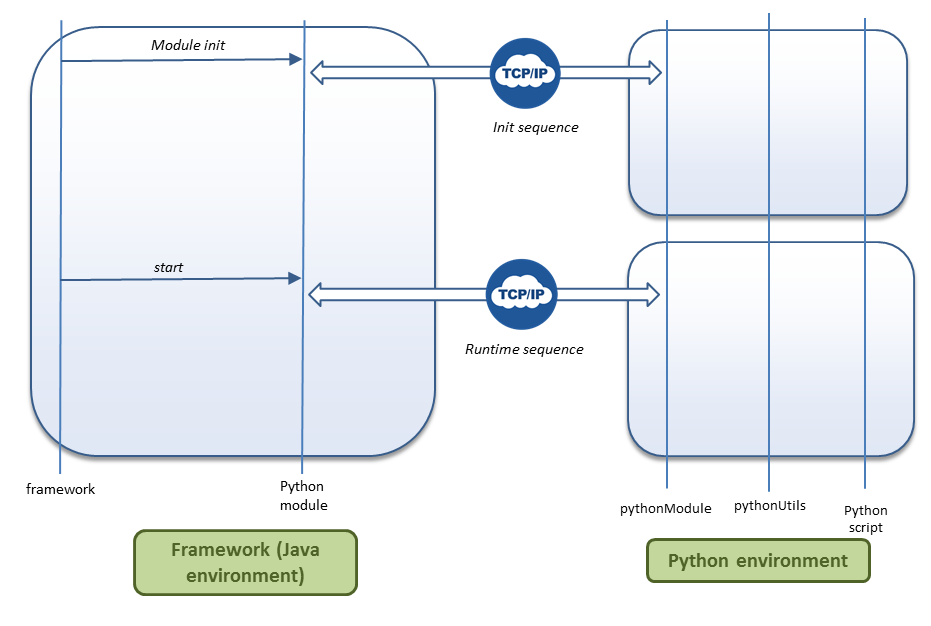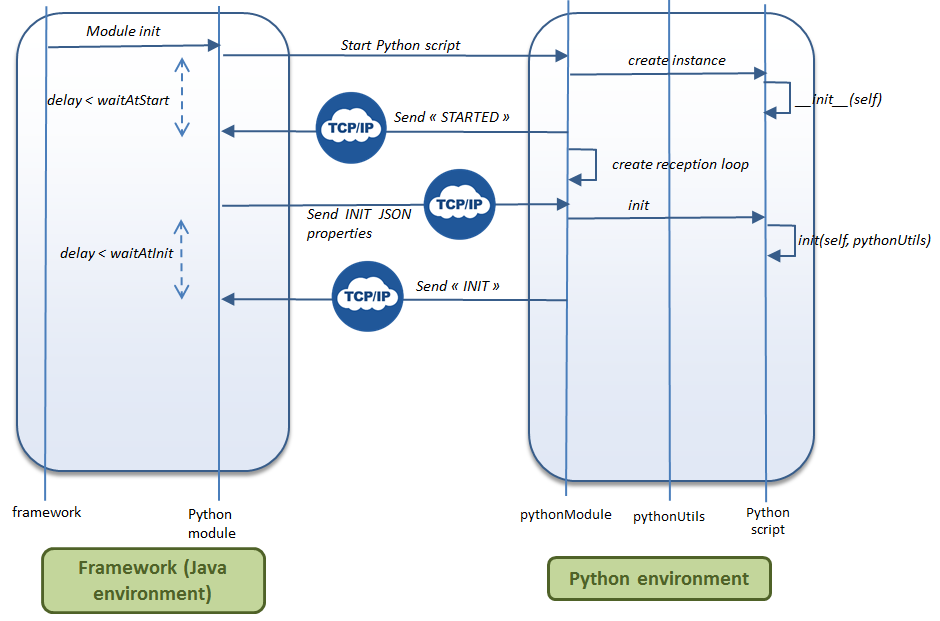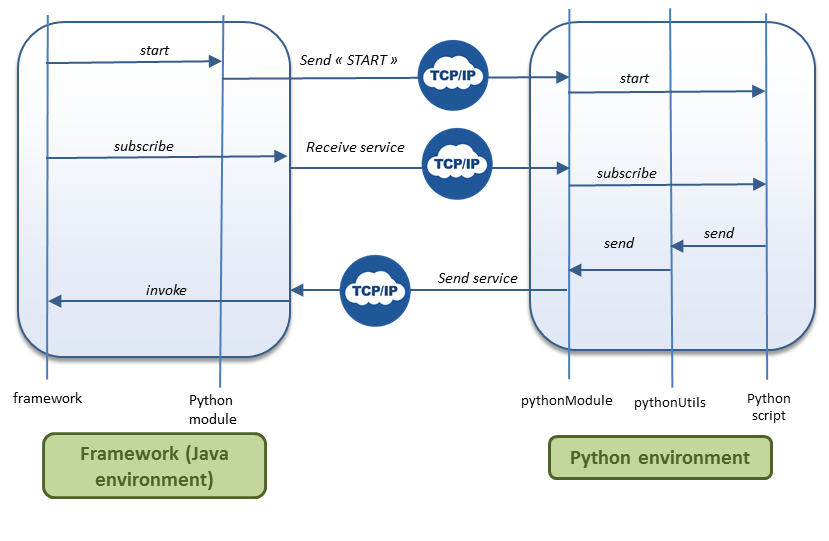Home
Categories
Dictionary
Glossary
Download
Project Details
Changes Log
What Links Here
FAQ
License
Python initialization and runtime sequence
1 Overview
2 Initialization phase
2.1 Python module initialization
3 Runtime phase
4 Using lengthy methods for the Python scripts
5 Notes
6 See also
2 Initialization phase
2.1 Python module initialization
3 Runtime phase
4 Using lengthy methods for the Python scripts
5 Notes
6 See also
This article explains the initialization and runtime sequence of Python socket modules.


Note that before Python modules version 1.4, or if JSON is not supported by the Python module, the initialization sequence is a little different. See Python initialization sequence for version 1.3.
The Python module will be able to retriefe the properties with the following methods of the

Overview
The initialization and runtime sequence of Python scripts follows two general phases:- The initialization phase: this phase takes place during the module initialization
- The runtime phase: this phase takes place after the module start
It can be the case if the Python script takes too much time to start-up, or if there is an exception during the initialization of the script
, then the Python module initialization will be aborted. Else the runtime phase will be started.
Initialization phase
The initialization phase follows the following steps:- The Python script is started using the specified Python executable in a separate process
- The
pythonModule.pyscript sends a "STARTED" message to the Python module - If a init EntryPoint was provided, the Python script specific
initmethod is called. See Python module initialization for more information - The Python script specific
initmethod is called[2]This method is called only if the, and theinit(self, pythonUtils)method is specified for the Python scriptpythonModule.pyscript sends a "INIT" message to the Python module
- The Python script start-up and instantiation took longer than the expected waitAtStart parameter[3]
If not specified, the value is set to 200 ms. See also Waiting for Python runtime initialization
- The Python script init EntryPoint call took longer than the expected waitAtInit parameter[4]
If not specified, the value is set to 500 ms. See also Waiting for Python script initialization

Note that before Python modules version 1.4, or if JSON is not supported by the Python module, the initialization sequence is a little different. See Python initialization sequence for version 1.3.
Python module initialization
The Python module receives a JSON content with the "-INIT-" key and the properties array as values, and the Python script specificinit method is called. This method is called only if the init(self, pythonUtils) method is specified for the Python script.The Python module will be able to retriefe the properties with the following methods of the
pythonUtils script:def hasProperty(self, name)returns true if there is a property will the specified namedef getProperty(self, name)returns the property value will the specified name
<pythonModule name="module1"> <pythonImplementation path="pythonAppli"> <initEntryPoint method="init" /> </pythonImplementation> <interfaces> <subscribe service="service1" /> <push service="service2" attach="attach"/> </interfaces> <properties> <property key="propBool" type="boolean" /> <property key="propString" type="string" /> <property key="propInt" type="int" /> </properties> </pythonModule>We can retrieve the properties values with the following code:
def init(self, pythonUtils): theIntProperty = pythonUtils.getProperty("propInt") theIntProperty = pythonUtils.getProperty("propString") theBoolProperty = pythonUtils.getProperty("propBool")
Runtime phase
The runtime phase follows the following steps:- The Python script specific
startmethod is called[5]This method is called only if thestart(self, pythonUtils)method is specified for the Python script - Then the Python script will be notified for every services reception by the module, and the script can send services to the framework through the
pythonUtils.pyscript

Using lengthy methods for the Python scripts
If you have some code for initializing your Python script which takes a lot of time to complete, you can either:- Put this code in the
def __init__(self)(method, and make sure that the waitAtStart value if sufficient - Put this code in the
def init(self, pythonUtils)(method, and make sure that the waitAtInit value if sufficient
Notes
- ^ It can be the case if the Python script takes too much time to start-up, or if there is an exception during the initialization of the script
- ^ This method is called only if the
init(self, pythonUtils)method is specified for the Python script - ^ If not specified, the value is set to 200 ms
- ^ If not specified, the value is set to 500 ms
- ^ This method is called only if the
start(self, pythonUtils)method is specified for the Python script
See also
- Framework initialization and runtime sequence: This article presents the framework initialization, runtime, and shutdown sequences
- Waiting for Python initialization: This article explains how to configure the wait times for the Python socket modules initialization
- Python modules: Python modules are modules which are scripted in the Python scripting language
×
![]()
Categories: concepts | python